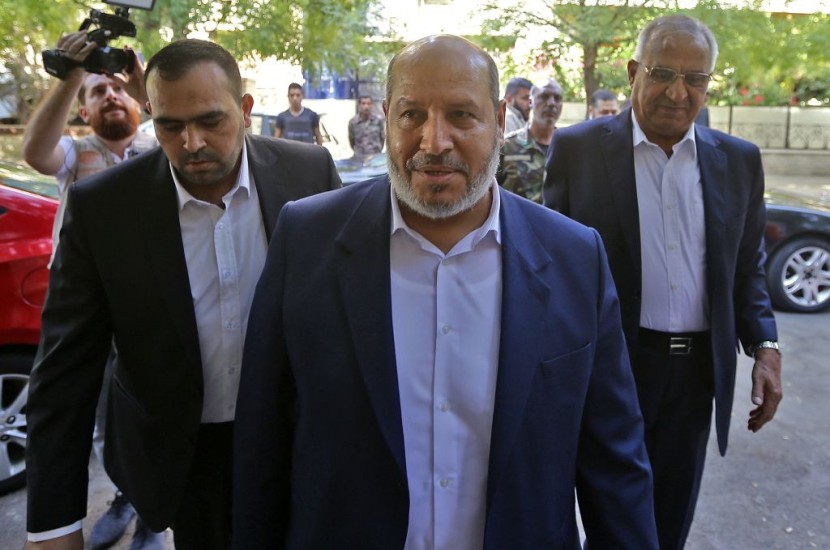
The Associated Press conducted an exclusive interview Wednesday (Apr. 24) with top Hamas political official Khalil al-Hayya, wherein he said that his militant group would be willing to lay down their arms and convert into a political party if an independent Palestinian state would be established along its pre-1967 borders as part of a two-state solution.
The comments were made amid a stalemate in the ceasefire talks brokered by Qatar, Egypt, and the United States, and the suggestion of Hamas disarming itself could become a significant concession for the group, which officially committed to the destruction of the Jewish state of Israel.
However, the offer would likely be dismissed by Israel as it has vowed to destroy Hamas for its attack on Oct. 7, while its current leadership, headed by Prime Minister Benjamin Netanyahu and his hard-liner government, is opposed to the creation of a Palestinian state on lands Israel captured during the Six-Day War in June 1967.
Istanbul-based al-Hayya told the AP that Hamas wanted to join the Palestinian Liberation Organization, headed by the rival Fatah faction, to form a unified government for both Gaza and the West Bank.
He added that Hamas would accept what he said was "a fully sovereign Palestinian state in the West Bank and Gaza Strip and the return of Palestinian refugees in accordance with the international resolutions," along Israel's pre-1967 borders.
Only then would Hamas disarm itself and become a purely political party, al-Hayya insisted.
"All the experiences of people who fought against occupiers, when they became independent and obtained their rights and their state, what have these forces done?" he told the AP.
"They have turned into political parties and their defending fighting forces have turned into the national army."
Hamas has slightly modified its public position to increase the chances of establishing a Palestinian state alongside Israel.
However, its official political program still "rejects any alternative to the full liberation of Palestine, from the river to the sea," which meant the area reflecting from the length of the Jordan River to the Mediterranean Sea, which included areas currently making up Israel.
During the interview, al-Hayya did not say whether his apparent embrace of a two-state solution would mean an end to the Palestinian conflict with Israel or an interim step toward the group's goal of destroying Israel.
Neither Israel nor the internationally recognized Palestinian Authority had any immediate response to al-Hayya's statements.
Israeli forces are currently preparing an offensive in the southern city of Rafah just a few weeks after it withdrew from the area.
Israel said that it dismantled most of the 24 Hamas battalions since the start of the war, but al-Hayya dismissed such claims.
"[Israel has] not destroyed more than 20% of [Hamas's] capabilities, neither human nor in the field," he asserted. "If they can't finish [Hamas] off, what is the solution? The solution is to go to consensus."
Most of Hamas's top political officials left its base in Qatar last week to travel to Turkey to meet with Turkish President Recep Tayyip Erdogan on Apr. 20. al-Hayya denied that a permanent move of the group's main political office was ongoing, saying that Hamas wanted to see Qatar continue in its capacity as the mediator in the negotiations.
In addition, al-Hayya denied Israeli and US accusations that Hamas was not serious about a ceasefire deal, saying that the group does not precisely know how many hostages remained in Gaza and were still alive.
He also insisted on a ceasefire and demanded that Israel should withdraw its troops in exchange for the hostages, both of which Israeli officials have dismissed.
"If we are not assured the war will end, why would I hand over the prisoners?" al-Hayya said.
He also implicitly threatened that Hamas would attack Israeli or other forces that might be stationed around a floating pier the US has been scrambling to build off the coast of Gaza to deliver aid by sea.
"We categorically reject any non-Palestinian presence in Gaza, whether at sea or on land, and we will deal with any military force present in these places, Israeli or otherwise... as an occupying power," he insisted.
al-Hayya further denied that Hamas militants targeted civilians on Oct. 7 despite massive evidence to the contrary, saying that he does not regret the attack and that it was a diplomatic victory for the Palestinian cause.
He added that Israeli attempts to destroy Hamas would ultimately fail as there would always be armed uprisings in the name of a free Palestine and international efforts to call on world leaders to recognize it as a full-fledged country and divest from Israel.
"Let's say that they have destroyed Hamas. Are the Palestinian people gone?" he rhetorically asked.








